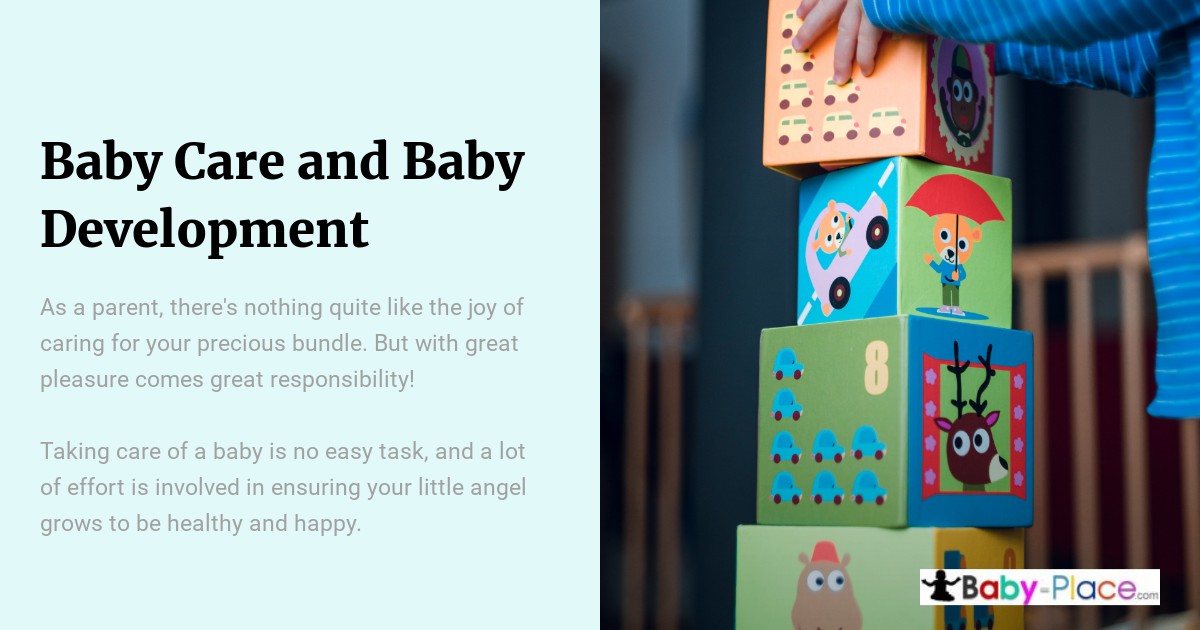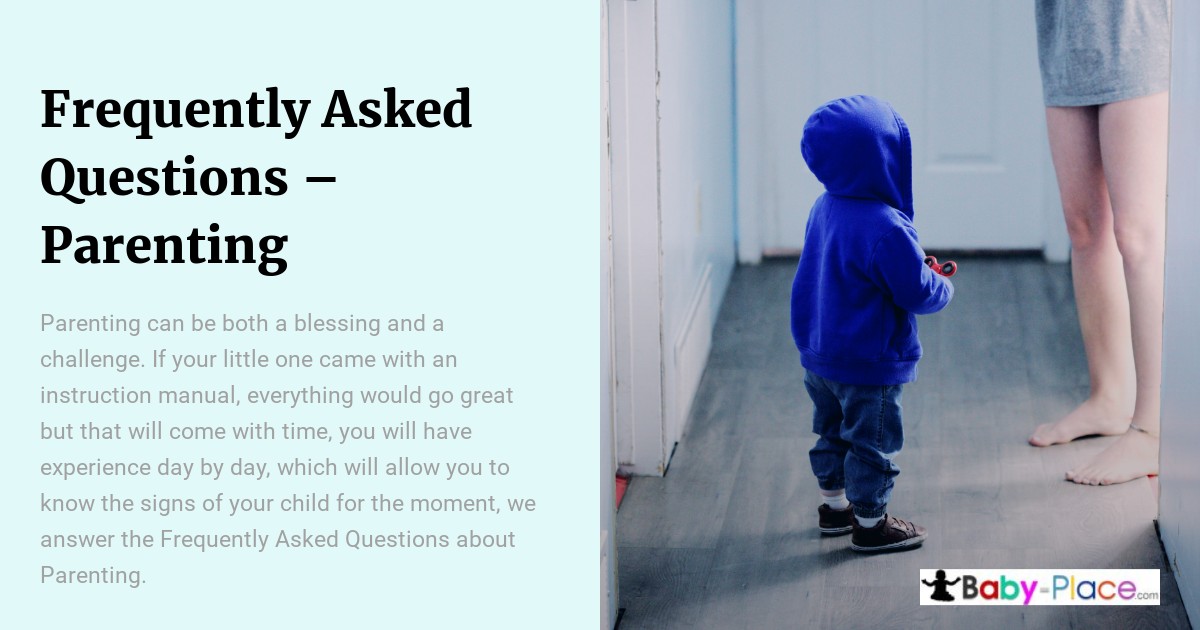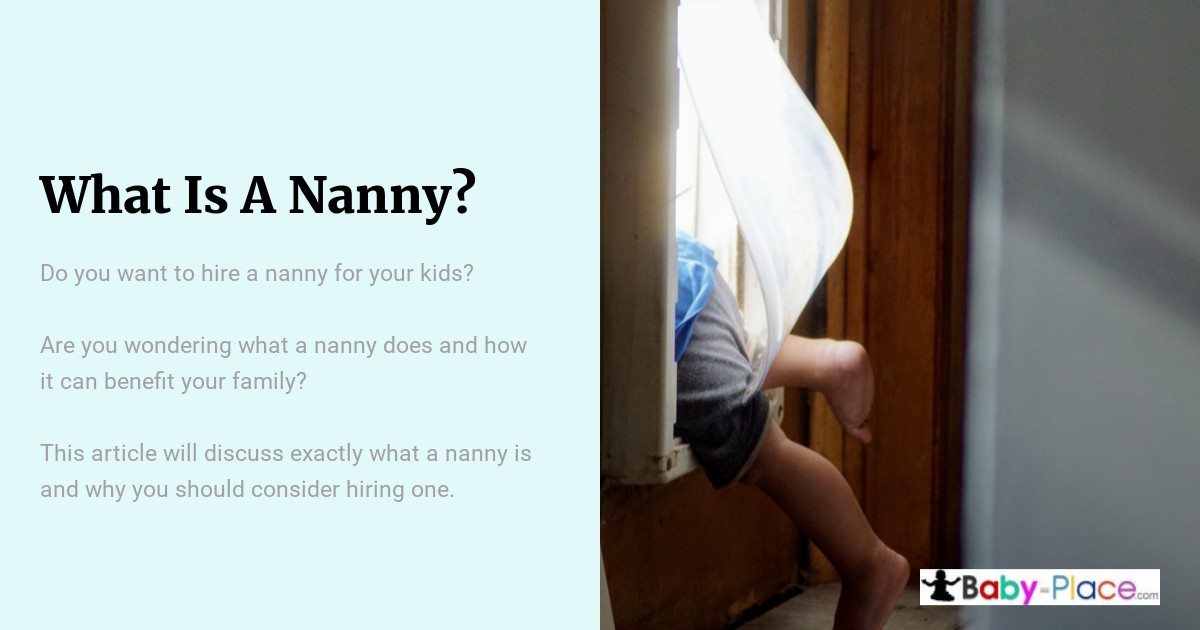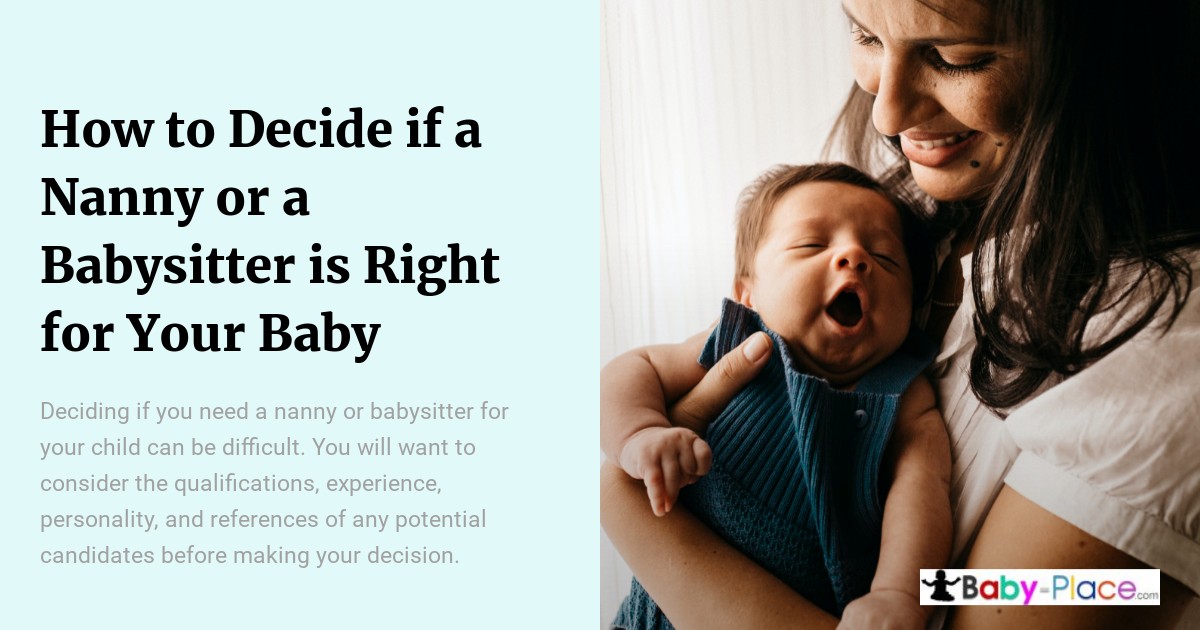
As a parent, there’s nothing quite like the joy of caring for your precious bundle. But with great pleasure comes great responsibility!
Caring for a baby is no easy task, and a lot of effort is involved in ensuring your little angel grows healthy and happy.
Introduction to Baby Care and Development
Baby care and development involve a wide range of activities to ensure the health and well-being of your new little one, from the basics of changing diapers, swaddling, and bottle-feeding to maximizing their developmental accomplishments in pursuit of linguistic proficiency and gross motor skills.
Nurturing a newborn involves far more than providing food, clothing, and shelter. Parents can also offer physical guidance, emotional comfort, and mental stimulation so their infant can reach their fullest potential in physical growth, cognitive development, language proficiency, and motor skills.
To achieve these goals successfully, parents must be familiar with basic pediatrician-recommended practices for baby care and milestones for healthy development during the first year of life.
Caring for an infant may seem overwhelming at times. Still, both parents must recognize infant parenting as one facet of motherhood/ fatherhood while continuing to nurture joyfulness in the home environment. Ultimately parenting is a lifelong relationship between parent and child that evolves. However, it begins with attending to basic needs such as food supervision at birth through fostering independent decision-making during adolescence.
Feeding and Nutrition for Babies
Feeding is integral to a baby’s development, as their diet is essential for proper growth. Breast milk or formula should make up most of an infant’s diet in the early months, but starting at six months, you can offer flavorful, nutrient-rich foods that support their growth as they transition to food.
Introducing various nutritious foods and flavors early to get your baby well acquainted with different tastes and textures is essential. For example, from six months, you can start training small amounts of iron-rich foods such as iron-fortified cereal, meat, fish, and chickpeas.
After eight months, babies may start enjoying soft finger foods such as pieces of toast, soft fruit, and veggies suitable for meals like mashed avocado or banana with cooked carrots and sweet potato. As your baby gets older (from 9 months onward), you can add smaller amounts of dairy products or plant-based alternatives such as yogurt or soaked oats, which are excellent sources of protein and carbohydrates.
Also, it is essential to note that from birth until nine months old, babies need only breast milk or formula to meet all their nutritional needs. From 6 to 9 months old, the vitamin drop supplement your healthcare provider recommends can help ensure your baby meets individual vitamin needs.
Always consult your healthcare provider before introducing solid food so they can help guide you in choosing the proper nutrition for your little one according to their age, weight, and developmental stage.
Sleep and Rest for Babies
Sleep and rest are essential for a baby’s healthy physical and mental development. In addition, babies need more sleep than adults because their brains are increasing, particularly during the first three months of life.
Babies require between 14-17 hours of sleep during the day and night combined. However, as the baby grows, their need for sleep reduces, and they may only need between 12- 16 hours each day by their first birthday, depending on the individual. When a baby sleeps, it allows them to gain energy, build strength and grow, which is an integral part of development in gaining motor skills, language skills, and cognitive skills and reducing stress levels.
Although babies will vary in how much sleep they need depending on age and individual circumstances, there is sure consistency that you should aim for to support your baby’s development:
- Ensure your baby gets two to four daytime naps that total up to around three to four hours during the day — this should be evenly spread out throughout the day, with the last rests around 4:00 p.m.(not later).
- Put your baby down when they seem drowsy but not yet asleep — this will help them learn to fall asleep independently. Try implementing some soothing techniques, such as singing or rocking, beforehand.
- Establish a bedtime routine — this can involve simple activities such as bath time, reading, or calming music before bed – try to keep it consistent every night!
When getting your little one settled into a suitable sleeping routine, factors like the room temperature’s comfort level or the room’s light must be taken into account, along with any sensory restrictions (e.g., noise). It’ll also help if you establish soothing habits like hugs or cuddles before bed so that your child feels secure even when alone!
Lastly, remember not to take away from any playtime, as this could impact your child’s development and well-being!
Mental and Physical Development for Babies
As babies grow, they experience a wide range of mental and physical development stages. Knowing what to expect along the way helps keep track of their growth. In addition, babies usually follow a predictable pattern of development milestones in each age group, which allows parents to prepare for each stage that follows.
Mental Development
During the first two years, babies quickly learn how to interact with those around them and their environment. Milestones in mental development include:
- By one month old, babies can track objects with their eyes and respond to loud noises or voices.
- By 2 months old, they recognize familiar faces and may be able to soothe themselves by sucking their thumb or using a pacifier.
- By 6 months old, they typically enjoy interacting with people and can respond when another person speaks directly to them.
- Around one year old, babies typically explore their environment by crawling, standing on furniture, walking holding onto furniture or independently walking steps (12-18 months).
- By 18 months old, children understand simplified words such as ‘no’ and ‘bye bye’ and recognize objects when shown pictures of them.
They will also babble more, including trying new sounds and words more often!
Physical Development
Babies also go through stages in physical development as they become increasingly active:
- At birth until around two months, they will mostly use reflexes such as adjusting movements while being handled or crawling toward a breast
- From two to five months, they begin connecting reflexes such as reaching out for an object or rolling over when lying on their back.
- From five to eight months, they start using more significant body movements like sitting unaided or crawling.
- Nine to twelve-month-olds can usually pull themselves up when standing up or stand without support for short periods.
- From one year onwards, children are typically walking around steadily with some command of motor skills like picking up objects with a thumb and finger pincher grip.
These milestone moments help parents understand how the baby is developing mentally and physically at each stage, one that is full of surprises yet fun simultaneously!
Immunization and Health Care for Babies
Immunization and health care for babies are essential parts of keeping them healthy. Immunizations protect babies from diseases that can cause severe illness or, in some cases, death. All newborns should receive a series of immunizations based on recommended schedules by the Centers for Disease Control and Prevention (CDC).
Keep track of when your baby is due for vaccinations by visiting your healthcare provider or local public health clinic. Vaccines protect against various diseases, including diphtheria, tetanus, pertussis, hepatitis B, rotavirus, Haemophilus influenza, pneumonia, and meningitis. In addition to the recommended vaccine schedule, it’s essential to give your baby regular checkups and follow the advice offered by your healthcare provider or pediatrician.
Other than immunization and screenings such as hearing tests and developmental screening tests that may help contribute to early indications of potential delays in motor skills or coordination delays as well as language development delays – regularly scheduled physical examinations also serve to keep any potential issues with general health in check such as heart murmurs; eye conditions such as crossed eyes; ear fluid and common infections; digestive problems; congenital metabolic disorders; nutrition intake; and skin rashes or other skin conditions. Lastly, use the physical exams to discuss any questions you have about what’s going on with development at home, like sleeping patterns and tips for behavior modification during toddler years, for example!
Social and Emotional Development for Babies
Social and emotional development for babies starts as soon as they are born and continues throughout life. By the time they are one year old, babies will have already developed several essential skills that will help them to interact socially with others. Parents, caregivers, and professionals must take an active role in nurturing this development.
Babies learn most of their social and emotional skills through interactions with their primary caregiver or parent. Depending on the environment, these interactions can vary greatly. Still, they could include regular conversations and expressions of emotion (e.g., smiling, laughing), playing or exploring together, or even just sitting together in silence. Babies who experience secure relationships with their carers tend to develop stronger self-esteem and increased confidence when interacting with others outside the home environment.
As babies age, they begin to form attachments with other people, such as siblings, playmates, or extended family members, who often become essential members of their social world before kindy age. Watching other people interact helps babies understand the rules of social behavior, such as how to share toys and negotiate space with others efficiently but also fosters independence by nurturing a deeper understanding of self-regulation, such as impulse control and emotional regulation, at an early age.
Babies also benefit from spending time outdoors observing nature or participating in outdoor activities such as simple sports like throwing/catching a ball or running/jumping/skipping games, which can provide sensory input that may additionally aid fine motor skill development at the same time during this pivotal stage of growth for infants.
Safety and Security for Babies
When it comes to baby care, safety and security should always be of the highest priority. Most babies’ injuries occur in their home environment, so parents need to take extra precautions in and around the home, car, and playground. Sound safety practices should become essential for you and your family when caring for your baby.
At Home
Creating a safe environment means securing cords and wires that could quickly become tangled around your baby’s neck, eliminating any sharp edges or breakable items that could pose a risk of injury, and making sure any doors or drawers are childproofed with locks. Clothing items such as thick sweaters and lingerie with ribbons/strings/elongated earrings can also pose choking hazards, so these should be kept away from your child’s reach while dressing them up. When bathing your baby, ensure that all quality stands, such as hot water temperature tests, are considered.
In The Car
Car safety is another vital factor in keeping your baby secure. Properly fitted car seats must be used whenever you’re traveling with a baby – whether for a short or long journey. Ensure that the straps fit snugly against your baby’s body claiming their head one inch above the top of the restraints when strapped. Additionally, babies aged 1-3 should have additional padding against their chest on a side-facing seat for added comfort and protection in case another accident occurs on the road.
At Playground/Daycare Centers
Play only in safe areas away from roads or any other traffic spots; equipped with soft flooring material such as rubber mats, suitable toys, and non-toxic surfaces (don’t forget to check product labels). Also, ensure that any benches or slides are securely connected to the ground structure. If you’re not at home with your little one, opt for licensed daycare centers that meet specific health department regulations where possible! Last but not least – if you intend to let them roam freely in public places, ensure they’re always accompanied by an adult carer who can keep an eye out!
Parental Support and Guidance for Baby Care and Development
As parents, it is essential to provide your baby with love and support during their first year of life. Proper care and guidance can help with infant development in both physical and emotional ways. It is important to remember that every baby is unique so routines may vary from baby to baby.
In the earliest months of a baby’s life, frequent interaction and skin-to-skin contact are essential for proper growth and development. This contact helps strengthen emotional bonds, facilitates communication, promotes physical coordination, improves concentration, increases self-esteem, and ultimately allows a child become more independent as they age. As babies age, they become more mobile. Hands-on exploration helps them learn about their environment.
As babies grow into toddlers, they will begin to gain greater control over their movements. To be safe as they explore around them, they must be supervised at all times while using walkers or playing on jungle gyms or slides in the backyard or at the park. In addition, sensory development must be encouraged through activities like art projects involving finger painting or playdough sculptures where your children can feel how different materials move through their fingers.
Beyond tactile experiences involving movement and textures, playtime should also involve imaginative scenarios such as playing pretend house when preparing meals for family members or visiting a toy store where items can be “purchased” for make-believe play. Reading stories together initially is also beneficial for language development as your toddler learns new words from reading books together. Singing simple songs together helps cement social connections between parent and child while aiding in the cognitive learning of nursery rhymes which assists in speech pattern formation. As your child grows, their sense of security can be further strengthened by following routine bedtimes where, if possible, you share the same room, allowing further closeness between parent and child when developing independence can appear daunting. Yet, those moments spent together ease separation anxiety while creating lifelong memories paving the way forward into secure adulthood with trusting relationships considered normal going forward.
Frequently Asked Questions:
What are the key aspects of baby care and development?
Baby care and development involve a wide range of activities to ensure the health and well-being of your baby. This includes basics like changing diapers, swaddling, and bottle-feeding, as well as fostering developmental milestones in areas such as linguistic proficiency and gross motor skills. Parents should also provide physical guidance, emotional comfort, and mental stimulation to help their baby reach their fullest potential.
When should I start introducing solid foods to my baby?
You can start introducing solid foods to your baby at around six months of age. Begin with small amounts of iron-rich foods like iron-fortified cereal, meat, fish, and chickpeas. From eight months onward, you can offer soft finger foods such as pieces of toast, soft fruit, and veggies. Always consult your healthcare provider before introducing solid foods to ensure they meet your baby's nutritional needs.
How much sleep does a baby need for healthy development?
Babies require between 14-17 hours of sleep per day during the first few months, which includes both daytime naps and nighttime sleep. By their first birthday, this reduces to around 12-16 hours per day. It's important to ensure your baby gets 2-4 daytime naps totaling 3-4 hours, with the last nap ending by 4:00 p.m. Establishing a consistent bedtime routine can also help support healthy sleep habits.
What are some important milestones in a baby's mental and physical development?
Mental development milestones include tracking objects with their eyes by one month, recognizing familiar faces by two months, and responding to direct speech by six months. Physically, babies progress from reflexes like crawling toward a breast at birth to sitting unaided by five to eight months and walking steadily by one year. These milestones help parents track their baby's growth and development.
Why are immunizations important for babies?
Immunizations protect babies from serious diseases that can cause severe illness or even death. The CDC recommends a series of vaccinations for newborns to guard against diseases like diphtheria, tetanus, pertussis, hepatitis B, and more. Regular checkups with a healthcare provider are also essential to monitor overall health, including developmental screenings and addressing any concerns about sleep, behavior, or nutrition.




